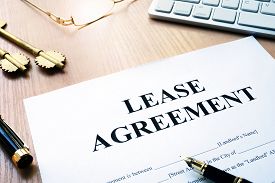
Does the Bankruptcy Code Adequately Protect Lessors?
The Bankruptcy Code often instructs a trustee or debtor to perform an act or make an election within a certain time. Sometimes the relevant provisions are intended to benefit a party in interest who is affected by a debtor’s or trustee’s action or election. Unfortunately, some of the provisions that prescribe a trustee or debtor to act fail to provide a remedy to the affected party in interest in the event the trustee or debtor does not act in compliance with the Code.
Let’s take lessors, common parties in interest affected by a bankruptcy. There generally are two types of lessors affected; lessors of real property and lessors of personal property. Fundamentally, these parties are affected because the Code authorizes a trustee or debtor to assume or reject a lease of real or personal property within certain time periods. See, e.g., 11 U.S.C. §§ 365(d)(1); 365(d)(2); 365(d)(4)(A).
While the Code does afford the trustee or debtor with a huge tool with which to restructure leases, it also attempts to protect lessors during the time before a trustee or debtor assumes or rejects a lease. With respect to a lease of nonresidential real property, section 365(d)(3) provides, in relevant part, that:
The trustee [or debtor] shall timely perform all the obligations of the debtor . . . arising from and after the order for relief under any unexpired lease of nonresidential real property, until such lease is assumed or rejected . . .
With respect to a lease of personal property, section 365(d)(5) provides, in relevant part, that:
The trustee [or debtor] shall timely perform all of the obligations of the debtor . . . first arising from and after 60 days after the order for relief in a case under chapter 11 of this title under an unexpired lease of personal property, until such lease is assumed or rejected . . .
Even though sections 365(d)(3) and (d)(5) appear to mandate performance by the trustee or debtor, the Bankruptcy Code fails to provide lessors with specific remedies in the event a trustee or debtor does not perform as required. This gap often leaves lessors fighting to protect their rights in bankruptcy.
Example 1: Real Property Leases
The case of In re Imperial Beverage Group, LLC, 457 B.R. 490 (Bankr. N.D. Tex. 2011) is illustrative of the difficult position facing landlords of real property leases.
In Imperial Beverage, the debtor was a small wholesale wine distributor. Prepetition the debtor had leased approximately 6,300 square feet of office and warehouse space from its landlord. The lease with the debtor expired on February 28, 2011.
Several months prior to the expiration date, the debtor stopped paying rent, which resulted in the landlord locking the debtor out of the leased space. The landlord then successfully prosecuted an eviction proceeding and obtained a judgment against the debtor to vacate the premises. On the eve of enforcing such judgment, the debtor filed chapter 11 bankruptcy.
After the bankruptcy, the landlord allowed the debtor access to the premises to remove its remaining property. Despite having been given access to the premises, however, the debtor still had not moved all its property from the leased space two months into its bankruptcy. But, even though the landlord’s primary goal was to remove the debtor’s property from its space, it failed to ask for any type of relief from the bankruptcy court until much later in the case.
After the Court had ordered the debtor to vacate the leased premises, the landlord filed a motion for an administrative priority claim for post-petition rent. Specifically, the landlord wanted (a) an administrative claim for rent due between the petition date and May 21, 2011, when the lease was deemed rejected pursuant to section 365(d)(4)(A) and thereafter (b) an administrative expense claim for rent due between May 21, 2011 and June 29, 2011—when the debtor was ordered to vacate the premises—as an actual and necessary cost of preserving the bankruptcy estate.
The Imperial Beverage Court first noted that, although the Bankruptcy Code provides remedies to a landlord when a debtor in default assumes a lease post-petition, the Bankruptcy Code does not specifically provide remedies when a debtor in default elects to reject a lease. The Court noted that the “Shopping Center Amendments” to the Code in 1984 attempted to ameliorate this situation by adding section 365(d)(3), which requires a debtor to comply with its lease obligations post-petition.
But, the Court recognized that section 365(d)(3) still provides no specific remedies. “Put simply, what remedy does a landlord have when a debtor ignores § 365(d)(3) and fails to pay post-petition rent timely?” Imperial Beverages, 457 B.R. at 498.
The Bankruptcy Code’s lack of specific direction has led many courts to develop three different approaches to the issue. The majority approach provides landlords with an automatic administrative expense claim for unsatisfied post-petition lease obligations that arise while the debtor decides to assume or reject a lease. The main reasoning behind this approach is that section 365(d)(3) seemingly mandates that a debtor must comply with post-petition obligations.
The minority approach holds that the only way a landlord can obtain an administrative expense claim for unpaid post-petition, pre-rejection rent is to prove that the rent was an actual and necessary cost of preserving the bankruptcy estate, pursuant to section 503(b)(1)(A). Under this approach, the landlord’s recovery is limited to the amount equal to the benefit of the debtor’s actual and necessary use of property, which benefit can be less than the contract rate under the lease.
The third approach emerged from the Fourth Circuit Court of Appeal’s opinion in I n re Midway Airlines Corp., 406 F.3d 229 (4th Cir. 2005), where the Court found the best approach lies in between both the minority and majority approaches. Imperial Beverages, 457 B.R. at 499. Under the Midway Airlines approach, a landlord may assert an administrative priority claim under section 503(b)—the general provision—but it is not required to show the unsatisfied post-petition obligation is an actual and necessary cost of preserving the estate under specific section 503(b)(1)(A). This approach was later supported by the Eighth Circuit in In re Burival, 613 F.3d 610 (8th Cir. 2010).
The Imperial Beverages Court adopted the last approach. However, the Court found that calculating the landlord’s administrative expense claims was more difficult than it first appeared. The Court identified four periods between the petition date and the date the debtor vacated the premises that were guided by different standards.
First, there was stub rent due between the petition date and the end of the first month that the debtor was in bankruptcy. Again, the Court found a divergence in views as to how to treat such claims. Under the “proration theory,” the debtor’s rent arises daily postpetition and thus any rent owed by the debtor between the petition date and the first day of the following month is entitled to administrative priority. Under the “billing theory”—which the Court adopted—section 365(d)(3) does not provide a basis for providing a debtor with an administrative expense claim for stub rent, but section 503(b)(1)(A) does. Thus, a landlord must prove that any stub rent is a necessary and actual expense of preserving the estate, in order to be entitled to an administrative priority claim.
In Imperial Beverages, the landlord was able to make such proof and thus received an administrative expense claim for stub rent. The Court determined that the amount of the administrative expense claim was presumed to be the normal contract rate under the lease—which significantly was not the holdover rate. Imperial Beverages, 457 B.R. at 502.
Second, the Court found that the obligations arising after the stub rent period and preceding the rejection date were entitled to administrative priority status under section 503(b), pursuant to the Midway Airlines approach.
Third, because the lease expired post-petition before the actual rejection deadline under section 365(d)(4) (120 days), the Court addressed the period between the expiration date and the deemed rejection date. The Court held that post-expiration, the landlord was required to prove actual and necessary benefit to the estate in order to be awarded an administrative priority claim under section 503(b)(1)(A). However, the Court again found that the actual and necessary benefit was presumed to be the normal contract rate under the lease.
Finally, the Court addressed the rent due after the lease was deemed rejected by operation of law, pursuant to section 365(d)(4). The Court again found that an administrative expense claim arising during this period did not arise from section 365(d)(3) and could only be asserted by demonstrating an actual benefit to the estate.
In the end, the Imperial Benefits Court awarded the landlord $15,074.13 in administrative expenses for the post-petition obligations unfulfilled by the debtor and trustee. There was no discussion in the opinion, however, how much the landlord spent on legal fees to obtain such claim.
Example 2: Personal Property Leases
In In re Bella Logistics LLC, Case No. 17-50913-CAG (Bankr. W.D .Tex., January 19, 2018), the Court reviewed a situation where a lessor under a personal property lease sought to obtain an administrative priority claim pursuant to section 365(d)(5) of the Bankruptcy Code.
The debtor was in the business of selling frack sand to end users and leased railway cars to transport the frack sand to its buyers. Due to a significant drop in business when the price of oil dropped in late 2014, the debtor filed a chapter 11 bankruptcy on April 19, 2017.
The lessor leased railway cars to the debtor to transport the frack sand to its customers. After the petition date, the lessor filed an application for allowance of an administrative expense claim for the use of its railway cars by the debtor, from the petition date through May 30, 2017.
Before the hearing on the lessor’s first application, the US Trustee filed a motion to convert the case to chapter 7. Contemporaneously, the lessor filed a separate application for the allowance of additional administrative expense claims for the use of its railway cars after May 30, 2017.
Less than a week later, the bankruptcy court granted the lessor’s first application and, shortly thereafter, granted the US Trustee’s motion to convert. But, the decision to convert was made before the Court considered the lessor’s second application for an administrative expense claim.
Immediately after conversion, the chapter 7 trustee moved to reject the railway car leases with the lessor and opposed the lessor’s second application for administrative expenses. This was approximately three months into the bankruptcy, during which time the debtor had received the benefit of using the leased railway cars.
The Bella Logistics Court first noted the mandatory obligations of a debtor to perform under a personal property lease pursuant to section 365(d)(5). The lessor argued that this mandatory obligation automatically elevated its claim to administrative priority under section 503(b), without the necessity of having to prove benefit to the estate. The lessor alternatively argued that the continued use of the railway cars did benefit the estate.
The trustee first argued that once the case converted to chapter 7, any unpaid postpetition rents became prepetition claims in the chapter 7 case pursuant to section 348(d) of the Bankruptcy Code, which provides, in relevant part:
A claim against the estate or the debtor that arises after the order for relief but before conversion in a case that is converted under sections 1112, 1208, or 1307 of this title, other than a claim specified in section 503(b) of this title, shall be treated for all purposes as if such claims had arisen immediately before the date of the filing of the petition.
The trustee also argued that, even if the lessor was entitled to an administrative expense claim, section 726(b) of the Code provides that in a chapter 11 case converted to chapter 7 the administrative expenses incurred during the chapter 11 phase are subordinated to administrative expenses incurred during the chapter 7 phase of the case. In this respect, the trustee further argued that all rents due during the month when the conversion occurred (which was mind-month) arose pre-conversion under the “billing theory,” because all rents were due at the beginning of such month.
Analogizing the case to the similar cases involving real property leases and section 365(d)(3), the court reviewed the majority, minority and Midway Airlines approach towards granting administrative priority claims for unsatisfied, pre-rejection obligations. Using the same analysis, Court held that the Midway Airlines approach appeared to best safeguard for lessors and be in compliance with Congressional intent.
The Court nonetheless concluded that even under the Midway Airlines approach, while postpetition, pre-rejection claims are automatically entitled to administrative priority under section 503(b) during the chapter 11 case, such claims still become subordinate to chapter 7 administrative expense claims after conversion by virtue of section 726(b) of the Bankruptcy Code.
While the Bella Logistics Court’s approach seemingly protects a personal property lessor’s claim, the Court acknowledged that a lessor’s chapter 11 administrative claim is subject to the risk that the bankruptcy estate may be administratively insolvent and may not have enough assets to pay all administrative priority claims.
Conclusion
Lessors are in a difficult position post-bankruptcy. Unlike most vendors, who can elect to stop doing business with a debtor, a lessor is generally required to continue to honor its lease obligations until the debtor elects to reject the lease. While the Bankruptcy Code provides specific remedies to lessors when a debtor assumes its leases, it does not specifically provide remedies when the debtor or trustee fails to honor lease obligations prior to the rejection of its leases.
As illustrated by the cases cited above, the lessor is often left to fight for an administrative priority claim under section 503(b) of the Code. The legal costs alone may not make such a fight attractive. And, even if the lessor prevails in obtaining an administrative priority claim, it is still subject to the risk of the debtor’s estate holding insufficient assets to pay all administrative claimants, which risk is compounded in cases where a debtor converts to chapter 7. To avoid such risk, in many cases the lessor might be better served if it proactively asks the bankruptcy court to enforce the mandates of sections 365(d)(3) and 365(d)(5) early in the case rather than simply wait to request an administrative claim later.





